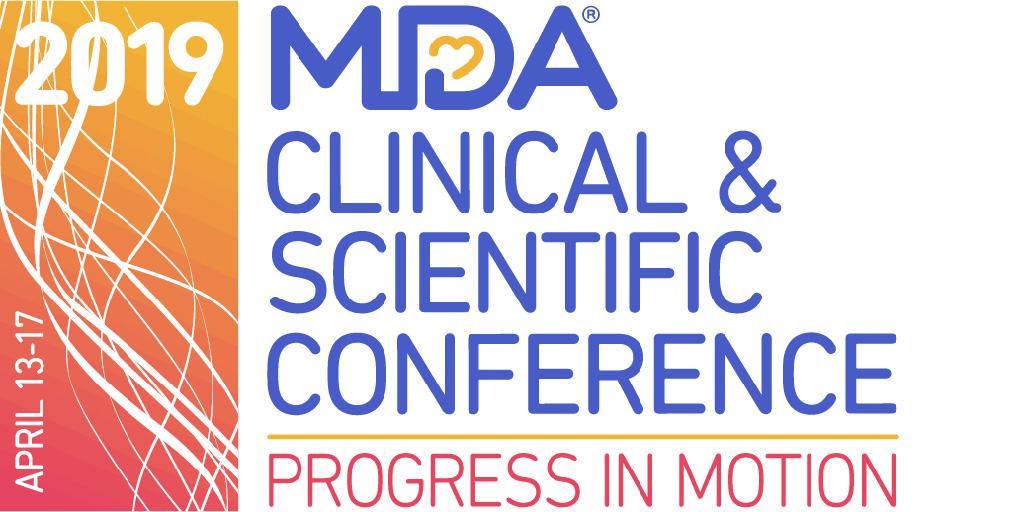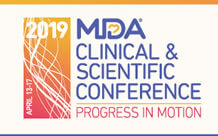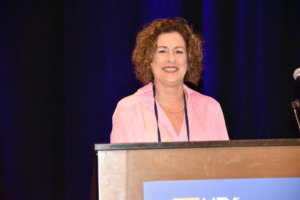
2019 Clinical & Scientific Conference Highlight: Physical, Occupational, and Speech Therapy Considerations in NMD
By Ori Rokach | Monday, July 8, 2019

During a late-morning session on the final day of the 2019 Clinical & Scientific Conference, five healthcare professionals — Laurie Sterling, a speech therapist at the Texas Children’s Hospital; Dr. Roxanna Bendixen, an occupational therapist and assistant professor at the University of Pittsburgh; Jennifer Chapin, a speech therapist at the University of Florida; Dr. Melissa Fox, a physiotherapist at the University of Virginia Health System; and Dr. Linda Lowes, a physiotherapist at Nationwide Children’s Hospital — spoke about the cognitive, behavioral, dietary, and mobility aspects of patient care.
Today, multidisciplinary clinics are considered the standard of care for both adult and pediatric patients with neuromuscular diseases. In a single visit, patients can interact with clinicians from different specialties — plus physical, occupational, and speech therapists and other patient advocates — to form innovative and highly specialized treatment plans. And this, the session panel said, is key because people living with neuromuscular diseases (NMDs) often have to approach their treatment from multiple perspectives.

Laurie Sterling
Cognitive, mental, and behavioral considerations
Some patients diagnosed with NMDs might struggle with executive functions, aka the functions people use in everyday independent living. Examples include maintaining attention, resisting impulses, initiating tasks, solving problems, and maintaining flexibility. Physicians can recognize when patients need to make adjustments in their home, or outside the clinic’s controlled environment. The panel suggested that caregivers pay special attention to instructions given by clinicians and follow up to ensure modifications have been properly executed. Clinicians too, can sit down with patients in a quiet clinic room, where communication can be more effective, especially when treatment instructions need to be given.
Laurie also suggested that clinicians ask patients questions about tasks they have performed or plan to execute in the near future. Sometimes, patients struggling with executive functions might give answers that do not match their physical capabilities. For instance, a patient with ambulatory issues might answer that he or she is planning to go for a walk in the park. If that doesn’t match the patient’s ability, it could indicate that the patient has a problem with planning.
This kind of cognitive challenge, particularly in patients with frontotemporal dementia (FTD), can be compounded by social and behavioral changes like apathy and decreased recognition of faces, which might result in communication barriers, and then, resistance to treatments like feeding tubes or ventilation. These changes can affect relationships and create significant frustration. In this case, caregivers must be educated about disease progression and what to expect in the future. Ultimately, clinicians can decide what works best for every individual based on dedicated interaction with each patient and his or her family.
Dietary aspects
Patients diagnosed with amyotrophic lateral sclerosis (ALS) may eventually experience malnutrition due to appetite change, hypermetabolism, dysphagia (difficulty in swallowing), and difficulty feeding. These conditions increase the risk of death by eight times, though it’s important to note that improvements in care have significantly reduced malnutrition-related deaths in ALS. Still, addressing nutrition needs during multidisciplinary clinic visits is crucial.
Jennifer presented a video that exemplified food clearance abnormalities in a patient diagnosed with ALS and experiencing swallowing impairment. Not being able to swallow easily can lead to pneumonia and decrease quality of life. As swallowing efficiency declines, patients with ALS also can report fatigue while eating and drinking. Thus, dietitians working with these patients might often recommend calorically condensed oral supplements and food consistency modifications to avoid malnutrition and muscle mass loss. It is also recommended for patients who experience fatigue while eating to eat at times when they are not exhausted, or to eat later at night.
Movement and development for infants
Dr. Lowes talked about teaching new motor skills in babies with spinal muscular atrophy (SMA). It does take much practice, and an in-home body weight support system can help infants to learn how to walk correctly. Because infants with SMA cannot support their body weight, this type of equipment can be vital for their development; however, it is essential that this equipment is used only with infants who can hold their head up on their own. Body-weight support systems can allow children to play with others, something that can be immensely valuable for their development.

Dr. Roxanna Bendixen
Sleep challenges
Dr. Bendixen discussed the importance of sleep in boys diagnosed with Duchenne muscular dystrophy (DMD) and how crucial it is to make sure these boys sleep well. Lack of sleep can result in many chronic health conditions including fatigue, cognitive issues, attention deficits, anxiety, bipolar disorder, depression, and early mortality. Boys diagnosed with DMD might fatigue easy, have psychosocial and behavior challenges, have a hard time recovering, and experience pulmonary problems. Therefore, it is important for patients to report how long they sleep and how many times during the night they tend to wake up. To induce sleep, it is essential to make sure that the environment is cold and dark. Additionally, it is important to avoid screens (video games, TV, computers, and more) close to bedtime as bright light is known to disturb these rhythms. Ultimately, considering all the aspects of daily life when treating a patient with neuromuscular disease is crucial for maintaining the highest quality of life. Entering this process with knowledge can foster better relationships between patients, caregivers, and healthcare professionals.
Disclaimer: No content on this site should ever be used as a substitute for direct medical advice from your doctor or other qualified clinician.




